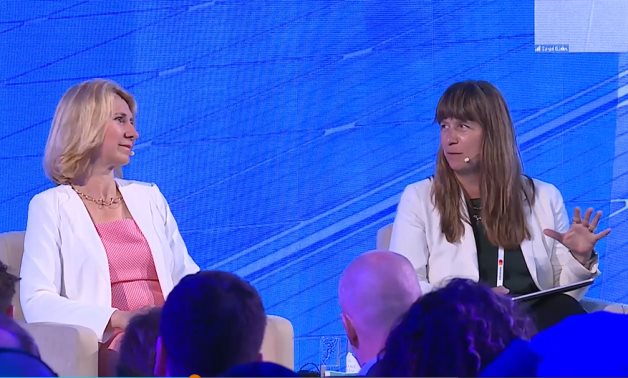
The Managing Director, Southern and Eastern Mediterranean at the European Bank for Reconstruction and Development (EBRD), Heike Harmgart, during the panel.
CAIRO - 17 May 2023: "Deeply dependent countries like Egypt, with 80 percent of grain imports from Russia and Ukraine, and Tunisia have also started to increase local production and increased efficiency of local production and have started to diversify," the Managing Director, Southern and Eastern Mediterranean at the European Bank for Reconstruction and Development (EBRD), Heike Harmgart, said.
Harmgart stated Tuesday that the pressure of global food prices has led to more diversification strategies.
“This is also of course giving hope that there is a sort of a moderation of global food prices passed through to these countries,” She added.
These statements came days after Egypt announced the start of the wheat harvest season along with a number of crops in the East Oweinat in the Western Desert.
East Oweinat which lies 500 km southwest of Lake Nasser, is Egypt's second largest wheat production project.
East Oweinat has cultivated 146,000 feddans so far, and aims to harvest 30,000 feddans of wheat, as well as other strategic crops this season, according to the Chairman of the National Company for Land Reclamation and Agriculture in East Oweinat, Tawfik Samy.
The aim of the East Oweinat project is to reclaim more than 186,000 feddans of desert land. It will produce an annual 3 million tons of various kinds of agricultural crops, including wheat.
However, the Managing Director, Southern and Eastern Mediterranean at the EBRD pointed out the drought problem in the region.
“For example, Morocco has one of the driest periods in over 40 years. We had praised Morocco for having a diversified grain importation strategy and very good local production, but now with this unprecedented drought that you see also in a number of the North African countries, that has also put another sort of pressure on in particular water intensive crop production,” she commented.
Regional Cooperation
Harmgart referred to the regional cooperation, saying that: ”for the first time also some of the Middle Eastern countries are speaking of joint storage opportunities and also better cooperation in crisis around food and grain in particular.”
She commented that this is another policy option that would potentially help to dampen some of these shocks and sort of these idiosyncratic weather shocks, and drought in Morocco.
As for a decent harvest, she said that maybe somewhere else in the Middle East to hopefully have a better joint solution to these problems, on the other hand, the same spikes aren’t seen due to the global effect, with a lot of local volatility around foods in these markets.
The EBRD Regional Economic Prospects Report
This came during a panel discussing the EBRD Regional Economic Prospects report; which the EBRD released during its annual meetings held in Uzbekistan.
The report included the EBRD revision of its forecasts for Egypt’s growth rate during the current and coming fiscal years.
As for the EBRD Regional Economic Prospects, It stated that growth in Egypt slowed to 4.2 percent year on year in July-December 2022 (the first half of fiscal year (FY) 2022/23), down from 9 percent in the same period the previous year.
The report attributed the slowdown to the deceleration in the manufacturing and construction sectors, which were affected by foreign currency shortages, as well as the impact of the war on Ukraine on Suez Canal and tourism revenues.
It also added that the Egyptian pound lost more than 50 percent of its value against the US dollar between March 2022 and April 2023, amid heightened external vulnerabilities and the central bank’s decision to shift to a flexible exchange-rate regime.
“This depreciation, coupled with elevated international commodity prices – Egypt is a net importer of food and oil – pushed inflation close to 33 percent, despite cumulative policy rate hikes of 1,000 basis points over the previous year,” it added.
Accordingly, the EBRD has revised its forecast for Egypt's real GDP growth for the current fiscal year to 4 percent, expecting it to rebound to 4.8 percent in the following fiscal year 2023/2024.

Comments
Leave a Comment